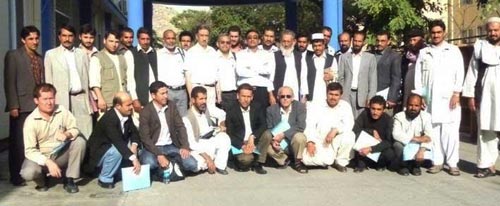Wheat research in Afghanistan can be regarded as still in its infancy. The country has released over a dozen winter and spring wheat varieties during the last ten years, but increased stakeholder coordination would improve wheat production and productivity. The Agricultural Research Institute of Afghanistan (ARIA) and CIMMYT have been collaboratively conducting a large number of wheat experiments over the last several years, which have contributed to the development of many popular wheat varieties. To enhance wheat research, and involve all Afghan wheat researchers in planning and results’ interpretation, the first ARIA-CIMMYT wheat researchers’ workshop was held during 19-21 September 2011 at the Ministry of Agriculture, Irrigation and Livestock, Kabul. The workshop was attended by 46 wheat researchers from a range of disciplines and regions.

M.T.Sahib Dad Pakbin, Advisor, ARIA, Sayed Noorudin Hariq, Ex-Senior Researcher, ARIA, and Mohammad Qasem Obaidi, Director, ARIA, chaired several technical sessions and contributed to deliberations and the finalization of recommendations. A. K. Joshi, Regional Wheat Breeder, CIMMYT-Nepal, Ramesh Chand, Professor of Plant Pathology, Banaras Hindu University, Varanasi, India, and Mahmood Osmanzai, former CIMMYT Wheat Agronomist and current Consultant with the Japan International Cooperation Agency, participated in technical sessions and contributed to the development of their respective disciplines’ research programs for the 2011-12 crop cycle.
Delegates deliberated over the release of wheat varieties in the country and agreed to conduct zone-wise varietal evaluation trials, with subsequent zone-wise varietal releases. Standardized norms on the use of common and regional checks in yield evaluation trials, and criteria for promotion and release of varieties were discussed, and it was agreed to use the National Rust Screening Nursery as a reference for deciding resistance and susceptibility of test entries. The workshop also identified six wheat, three barley, two durum, and three triticale varieties for commercial release.
It was also requested that CIMMYT organize two further workshops: one on research results’ analysis and interpretation, and another for ARIA researchers on rust scoring. This year, CIMMYT will also technically support a wheat breeding programme at ARIA-Kabul. Obaidi expressed that the collaboration should be continued, in order to consolidate and improve wheat research in the country.
In closing, Pakbin commented that it was the first time a dedicated workshop was conducted for wheat research in Afghanistan. Rajiv Sharma, Country Liaison Officer, Afghanistan, thanked the delegates for their participation and purposeful contributions. The workshop also agreed to invite other partners in the country to contribute their test entries to the programme, to avoid duplication of efforts and to bring about synergy in national-level operations.
 Capacity development
Capacity development